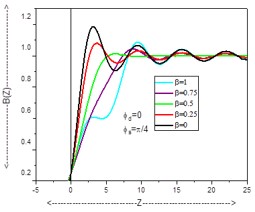Variable apodization method to reduce the effect of edge ringing of aberrated coherent optical systems
DOI:
https://doi.org/10.61343/jcm.v1i02.28Keywords:
Apodization, coherence, aberrations, edge imaging, imaging systemsAbstract
The coherent edge imaging of optical systems apodised with amplitude filters has been studied. Edge ringing can be appreciably mitigated using the chosen amplitude filters. The analytical studies were made for circular aperture. It is found that this type of apodization is more useful in reducing the ringing effect and also there is a perceptible increase in the edge gradient. Hence these amplitude filters are found to be effective in enhancing the resolving power aspects of edge imaging characteristics of optical systems
References
Barakat R, J. Opt.Soc.Am.52 264 (1964).
Araki T & Sakura T A, Opt Commun, 20, 373 (1977).
Barakat R. “Solution of the luneberg apodization problems”. J Opt Soc Am 1962; 52(3): 264-275. DOI: 10.1364/JOSA.52.000264.
Mills JP, Thompson BJ. “Effect of aberrations and apodization on the performance of coherent optical systems”. II. Imaging. J Opt Soc Am A 1986; 3(5): 704-716.
Venkanna M, Karuna Sagar D. “Reduction in edge-ringing in aberrated images of coherent edge objects by multishaded aperture”. Advances in Optics 2014; 2014: 963980. DOI: 10.1155/2014/963980.
Venkanna M, Karuna Sagar D. “Amplitude filters in shaping the point spread function of optical imaging systems”. Proc SPIE 2015; 9654: 96540A. DOI: 10.1117/12.2181610.
Katti PK, Gupta BN. “Effect of amplitude filter on the partially space coherent diffraction of a defocused optical system”. J Opt Soc Am 1972; 62(1): 41-44.
Tschunko HFA. Apodization and image contrast. Appl Opt 1979; 18(7): 955-956.
Araki T, Asakura T. Coherent apodization problems. Opt Commun 1997; 20(3): 373-377.
Hecht, E., Zajac, A., “Optics”, (Addison – Wesley, USA), 2nd Ed., p.422, 496, 497 & 512, (1987).
Wetherell, W.B. “Applied optics and optical engineering”, (Academic press, N.Y., Eds. R. R. Shannon & J.C. Wyant) vol.8, ch.6, p.173-283, (1980).
BARAKAT, R., “Solution of the Luneberg apodization problems”, J. OPT. SOC. AM., 52, P.264, 276 & 985, (1962). doi:10.1364/JOSA.52.000264
J. P. Mills and B. J. Thompson, “Effect of aberrations and apodization on the performance of coherent optical systems”, II. Imaging, Vol 3, pp 704, (1986).
Venkanna M. and Karuna Sagar D., “Reduction in edge-ringing in aberrated images of coherent edge objects by multishaded aperture”, J. of Advances in optics (2014). DOI:10.1155/2014/963980
P.K Katti and B.N. Gupta, “Effect of Amplitude filter on the partially Space Coherent diffraction of a Defocused optical System”, J. Opt. Soc. Am. 62, 1, 41-44 (1972)
Hubert F. A Tschunko, Apodization and Image Contrast, Appl.Opt. 18, 7, 955 (1979)
T.Araki and T. Asakura, Coherent Apodization Problems, Opt.Commu.20, 3,373-377 (1997)
Jacquinot P, Roizen-Dossier B. II Apodization. Prog.in Optics 1964; 3: 29-186. DOI:10.1016/S0079-6638(08)70570-5
Siu GG, Cheng L, Chiu DS. “Improved side-lobe suppression in asymmetric apodization”. J Phys D: Appl Phys 1994; 27(3): 459-463. DOI: 10.1088/0022-3727/27/3/005
Dowski ER, Cathey WT. “Extended depth of field through wavefront coding”. Appl Opt 1995; 34(11): 1859-1866. DOI: 10.1364/AO.34.001859.
Pan C, Chen J, Zhang R, Zhuang S. “The extension ratio of depth of field by wavefront coding method”. Opt Ex-press 2008; 16(17): 13364-13371. DOI: 10.1364/OE.16.013364.
Khonina SN, Ustinov AV. “Generalized apodization of an incoherent imaging system aimed for extending the depth of focus”. Pattern Recognition and Image Analysis 2015; 25(4): 626-631. DOI: 10.1134/S1054661815040100
Dzyuba A.P., Serafimovich P.G., Khonina S.N., Popov S.B., “Application of a neural network for calculating the surface relief of a different level two-zone lens with an increased depth of field”, Proc. of SPIE Vol. 11516, 115161A (2020); DOI:10.1117/12.2565993.
Khonina S.N., Volotovskiy S.G., Dzyuba A.P., Serafimovich P.G., Popov S.B., and Butt M.A., “Power phase apodization study on compensation defocusing and chromatic aberration in the imaging system”, Electronics (MDPI) 10, 1327-(15p), (2021); DOI:10.3390/electronics10111327
Barakat R. “Application of apodization to increase Two-point resolution by Sparrow criterion under incoherent illumination”. JOSA 1962; 52(3): 276-283. DOI: 10.1364/JOSA.52.000276.
Kowalczyk M, Zapata-Rodriguez CJ, “Martinez-Corral M. Asymmetric apodization in confocal scanning systems”. Appl Opt 1998; 37(35): 8206-8214
Khonina S.N. and Ustinov A.V., “Sharper focal spot for a radially polarized beam using ring aperture with phase jump”, Journal of Engineering (Hindawi Publishing Corporation), ID 512971, 8 pp. (2013) DOI: 10.1155/2013/512971
Reddy A. N. K., Sagar D. K., Khonina S. N., “Complex pupil masks for aberrated imaging of closely spaced objects”, Optics and Spectroscopy, 123(6) 940–949 (2017), DOI: 10.1134/S0030400X17120189
Reddy, A.N.K., Khonina S.N., “Apodization for improving the two-point resolution of coherent optical systems with defect of focus”, Applied Physics B 124, 229-(9p) (2018); DOI: 10.1007/s00340-018-7101-z
Reddy A.N.K., Hashemi M., Khonina S.N., “Apodization of two-dimensional pupils with aberrations”, Pramana – Journal of Physics 90, 77-(8p) (2018); DOI: 10.1007/s12043-018-1566-5
Hopkins HH, Zalar B. “Aberration tolerances based on line spread function”, J Mod Opt 1987; 34(3): 371-406. DOI: 10.1080/09500348714550391.
Sheppard CJR, Choudhury A. “Annular pupils, radial polarization, and superresolution”, Appl Opt 2004; 43(22): 4322-4327. DOI: 10.1364/AO.43.004322
Ratnam C, Lakshman Rao V, Goud SL. “Comparison of PSF maxima and minima of multiple annuli coded aperture (MACA) and complementary multiple annuli coded aperture (CMACA) systems”, J Phys D: Appl Phys 2006; 39: 4148-4152. DOI: 10.1088/0022-3727/39/19/005.
Khonina SN, Ustinov AV, Pelevina EA. “Analysis of wave aberration influence on reducing the focal spot size in a high-aperture focusing system”, J Opt 2011; 13(9): DOI: 10.1088/2040-8978/13/9/095702
Khonina S.N., Volotovskiy S.G., “Minimizing the bright/shadow focal spot size with controlled side-lobe in-crease in high-numerical-aperture focusing systems”, Advances in Optical Technologies (Hindawi Publishing Cor-poration), Volume 2013, Article ID 267684, 13pages, DOI: 10.1155/2013/267684.
T. Araki And T Asakura, “Apodized Images Of Coherently Illuminated Edges In The Presence Of Defocusing And Spherical Aberration”, Optika Aplicata, 1978 Viii/4, 159-170.

Downloads
Published
How to Cite
License
Copyright (c) 2023 Shailaja Pagolu

This work is licensed under a Creative Commons Attribution 4.0 International License.
Copyright© by the author(s). Published by journal of Condensed Matter. This is an open access article distributed under the terms of the Creative Commons Attribution (CC BY) license (https://creativecommons.org/licenses/by/4.0/), which permits unrestricted use, distribution, and reproduction in any medium, provided the original author(s) and source are credited.









